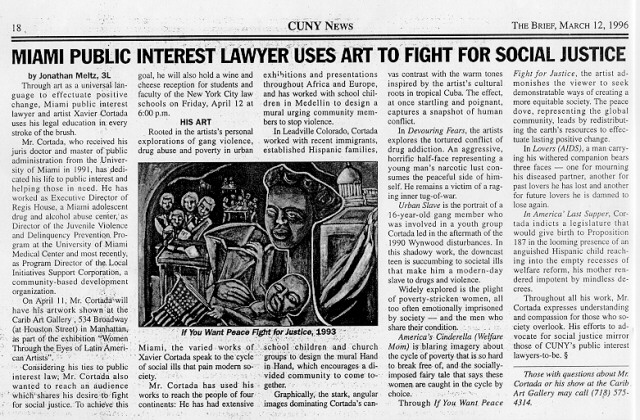| Miami Public Interest Lawyer Uses Art to Fight
Social Justice
by Jon Meltz
--CUNY News, New York, New York, March 12, 1996
Through art as a universal language to effectuate positive
change, Miami public interest lawyer and artist Xavier Cortada uses his legal education in
every stroke of the brush.
Mr. Cortada, who received his juris doctor and master of public administration from
the University of Miami in 1991, has dedicated his life to public interest and helping
those in need. He has worked as Exceutive Director of Regis House, A Miami adolescent drug
and alchol abuse center, as Director of the Juvenile Violence and Delinquency Prevention
Program at the University of Miami Medical Center and most recently as Program Director of
the Local Initiatives Support Corporation, a community-based developement organization.
On April 11, Mr. Cortada will have his artwork shown at the Carib Art Gallery, 534
Broadway (at Houston Street) in Manhattan, as part of the exhibition "Women Through
the Eyes of Latin American Artists".
Consideing his ties to public interest law, Mr. Cortada also wanted to reach an
audience which shares his desire to fight for social justice. To achieve this goal, he
will also hold a wine and cheese reception for students and faculty of the New York City
law schools on Friday, April 12 at 6:00 p.m.

HIS ART
Rooted in the artists's personal explorations of gang violence, drug abuse and poverty in
urban Miami, the varied works of Xavier Cortada speak to the cycle of social ills that
pain modern society. Mr. Cortada has used his works to reach the people of four
continents: He has had extensive exhibitions and presentations throughout Africa and
Europe, and has worked with school children in Medellin to design a mural urging community
members to stop violence.
In Leadville Colorado, Cortada worked with recent immigrants, established Hispanic
families, school children and church groups to design the mural Hand in Hand, which
encourages a divided community to come together. Graphically, the stark, angular
images dominating Cortada's canvas contrast with the warm tones inspired by the artist's
cultural roots in tropical Cuba. The effect, at once starling and poignant, captures a
snapshot of human conflict.
In Devouring Fears, the artists explores the tortured conflict of drug
addiction. An aggressive, horrific half-face representing a young man's narcotic lust
consumes the peaceful side of himself. He remains a victim of a raging inner tug-of-war.
Urban Slave is the portrait of a 16-yea-old gang member who was involved in a
youth group Cortada led in the aftermath of the 1990 Wynwood disturbances. In this shadowy
work, the downcast teen is succumbing to societal ills that make him a modern-day slave to
drugs and violence.
Widely explored is the plight of poverty-stricken women, all too often emotionally
imprisioned by society - and the men who share their condition.
America's Cinderella (Welfare Mom) is blaring imagery about the cycle of
poverty that is so hard to break free of, and the socially imposed fairy tale that says
these women are caught in the cycle by choice.
Through If You Want Peace Fight for Justice, the artist admonishes the viewer
to seek demonstratable ways of creating a more equitable society. The peace dove,
representing the global community. leads by redistributing the earth's resources to
effectuate positive change.
In Lovers (AIDS), a man carrying his withered companion bears three faces -
one for mourning his diseased partner, another for past lovers he has lost and another for
future lovers he is damned to lose again.
In America Last Supper, Cortada indicts a legislature that would give birth to
Proposition 187 in the looming presence of an anguished Hispanic child reaching into the
empty recesses of welfare reform, his mother rendered impotent by mindless decrees.
Throughout all his work, Mr. Cortada expresses understanding and compassion for
those who society overlook. His efforts to advocate for social justice mirror those of
CUNY's public interest lawyers-to-be.
|